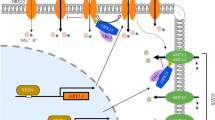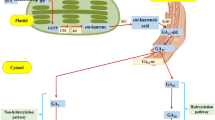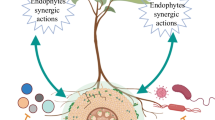Abstracts
Ethylene is a key gaseous hormone that controls various physiological processes in plants including growth, senescence, fruit ripening, and responses to abiotic and biotic stresses. In spite of some of these positive effects, the gas usually inhibits plant growth. While chemical fertilizers help plants grow better by providing soil-limited nutrients such as nitrogen and phosphate, over-usage often results in growth inhibition by soil contamination and subsequent stress responses in plants. Therefore, controlling ethylene production in plants becomes one of the attractive challenges to increase crop yields. Some soil bacteria among plant growth-promoting rhizobacteria (PGPRs) can stimulate plant growth even under stressful conditions by reducing ethylene levels in plants, hence the term “stress controllers” for these bacteria. Thus, manipulation of relevant genes or gene products might not only help clear polluted soil of contaminants but contribute to elevating the crop productivity. In this article, the beneficial soil bacteria and the mechanisms of reduced ethylene production in plants by stress controllers are discussed.

Similar content being viewed by others
References
Abeles FB, Morgan PW, Sltveit ME Jr (1992) Ethylene in plant biology. Academic, New York
Belimov AA, Safronova VI, Sergeyeva TA, Egorova TN, Matveyeva VA, Tsyganov VE, Borisov AY, Tikhonovich IA, Kluge C, Preisfeld A, Dietz K-J, Stepanok VV (2001) Characterization of plant growth promoting rhizobacteria isolated from polluted soils and containing 1-aminocyclopropane-1-carboxylate deaminase. Can J Microbiol 47:642–652
Blaha D, Prigent-Combaret C, Mirza MS, Moënne-Loccoz Y (2006) Phylogeny of the 1-aminocyclopropane-1-carboxylic acid deaminase-encoding gene acdS in phytobeneficial and pathogenic Proteobacteria and relation with strain biogeography. FEMS Microbiol Ecol 56:455–470
Cattelan AJ, Hartel PG, Fuhrmann JJ (1999) Screening for plant growth-promoting Rhizobacteria to promote early soybean growth. Soil Sci Soc Am J 63:1670–1680
Gleba D, Borisjuk NV, Borisjuk LG, Kneer R, Poulev A, Skarzhinskaya M, Dushenkov S, Logendra S, Gleba YY, Raskin I (1999) Use of plant roots for phytoremediation and molecular farming. Proc Natl Acad Sci USA 96:5973–5977
Glick BR (2005) Modulation of plant ethylene levels by the bacterial enzyme ACC deaminase. FEMS Microbiol Lett 251:1–7
Glick BR, Penrose DM, Li J (1998) A model for the lowering of plant ethylene concentrations by plant growth-promoting bacteria. J Theor Biol 190:63–68
Glick BR, Cheng Z, Czarny J, Duan J (2007) Promotion of plant growth by ACC deaminase-producing soil bacteria. Eur J Plant Pathol 119:329–339
Grichko VP, Glick BR (2001) Amelioration of flooding stress by ACC deaminase-containing plant growth-promoting bacteria. Plant Physiol Biochem 39:11–17
Haas D, Keel C (2003) Regulation of antibiotic production in root-colonizing Pseudomonas spp. and relevance for biological control of plant disease. Annu Rev Phytopathol 41:117–153
Kamilova F, Lamers G, Lugtenberg B (2008) Biocontrol strain Pseudomonas fluorescens WCS365 inhibits germination of Fusarium oxysporum spores in tomato root exudates as well as subsequent formation of new spores. Environ Microbiol 10:2455–2461
Kim JH, Kim WT, Kang BG (2001) IAA and N6-benzyladenine inhibit ethylene-regulated expression of ACC oxidase and synthase genes in mungbean hypocotyls. Plant Cell Physiol 42:1056–1061
Ma W, Guinel FC, Glick BR (2003) The Rhizobium leguminosarum bv. viciae ACC deaminase protein promotes the nodulation of pea plants. Appl Environ Microbiol 69:4396–4402
Ma W, Charles TC, Glick BR (2004) Expression of an exogenous 1-aminocyclopropane-1-carboxylate deaminase gene in Sinorhizobium meliloti increases its ability to nodulate alfalfa. Appl Environ Microbiol 70:5891–5897
Mayak S, Tirosh T, Glick BR (1999) Effect of wild-type and mutant plant growth-promoting Rhizobacteria on the rooting of mung bean cuttings. J Plant Growth Regul 18:49–53
Mayak S, Tirosh T, Glick BR (2004) Plant growth-promoting bacteria that confer resistance in tomato to salt stress. Plant Physiol Biochem 42:565–572
Meharg AA, Killham K (1995) Loss of exudates from the roots of perennial ryegrass inoculated with a range of microorganisms. Plant Soil 170:345–349
Morgan PW, Drew CD (1997) Ethylene and plant responses to stress. Physiol Plant 100:620–630
Reed MLE, Glick BR (2005) Growth of canola (Brassica napus) in the presence of plant growth-promoting bacteria and either copper or polycyclic aromatic hydrocarbons. Can J Microbiol 51:1061–1069
Robison MM, Shah S, Tamot B, Pauls KP, Moffatt BA, Glick BR (2001) Reduced symptoms of Verticillium wilt in transgenic tomato expressing a bacterial ACC deaminase. Mol Plant Pathol 2:135–145
Sisler EC, Serek M (1997) Inhibitors of ethylene responses at the receptor level: recent developments. Physiol Plant 100:577–582
Stearns JC, Shah S, Dixon DG, Greenberg BM, Glick BR (2005) Tolerance of transgenic canola expressing 1-aminocyclopropane-carboxylic acid deaminase to growth inhibition by nickel. Plant Physiol Biochem 43:701–708
Uren NC (2007) Types, amounts, and possible functions of compounds released into the rhizosphere by soil-grown plants. In: Pinton T, Varanini Z, Nannipieri P (eds) The rhizosphere, biochemistry and organic substances at the soil–plant interface, 2nd edn. CRC, Boca Raton, pp 1–21
Vessey JK (2003) Plant growth promoting rhizobacteria as biofertilizers. Plant Soil 255:571–586
Wang C, Knill E, Glick BR, Défago G (2000) Effect of transferring 1-aminocyclopropane-1-carboxylic acid (ACC) deaminase gene into Pseudomonas fluorenscens strain CHA0 and its gacA derivative CHA96 on their growth promoting and disease-suppressive capacities. Can J Microbiol 46:898–907
Author information
Authors and Affiliations
Corresponding authors
Additional information
H. S. Yun and S. C. Chang contributed to this work equally.
Rights and permissions
About this article
Cite this article
Kang, B.G., Kim, W.T., Yun, H.S. et al. Use of plant growth-promoting rhizobacteria to control stress responses of plant roots. Plant Biotechnol Rep 4, 179–183 (2010). https://doi.org/10.1007/s11816-010-0136-1
Received:
Accepted:
Published:
Issue Date:
DOI: https://doi.org/10.1007/s11816-010-0136-1




